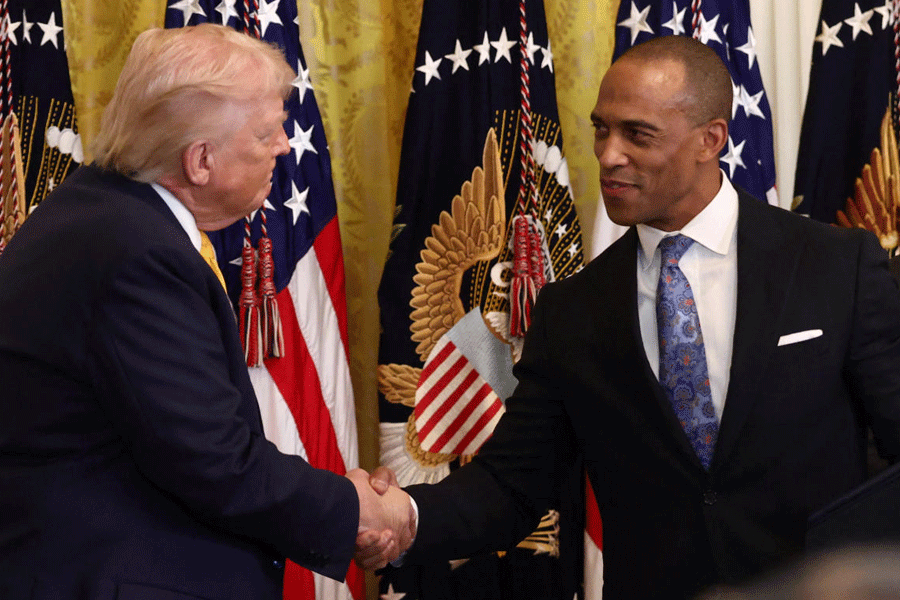 Friday, 20 February 2026
Friday, 20 February 2026
 Friday, 20 February 2026
Friday, 20 February 2026
Former US President Barack Obama Tuesday praised Harvard University for setting "an example" by rejecting the Trump administration's demands aimed at curbing campus activism, academic freedom, and diversity initiatives.
“Harvard has set an example for other higher-ed institutions — rejecting an unlawful and ham-handed attempt to stifle academic freedom, while taking concrete steps to make sure all students at Harvard can benefit from an environment of intellectual inquiry, rigorous debate and mutual respect. Let's hope other institutions follow suit,” Obama posted on X.
The controversy started after the Trump administration, in a letter dated April 11, demanded that Harvard University dismantle its diversity, equity, and inclusion (DEI) programs in hiring, admissions, and academic offerings.
The letter also called for reducing the influence of students and faculty in university decision-making and instituting screenings for student organisations and international students—measures purportedly aimed at addressing rising antisemitism on campuses.
The administration demanded that Harvard share hiring data with the government and engage an external body to verify that each academic department is "viewpoint diverse."
Harvard University President Alan M. Garber rejected the demands, arguing that they would compromise the university’s independence, infringe upon constitutional rights, and violate long-held academic freedoms.
"The university will not surrender its independence or relinquish its constitutional rights," Garber said Monday. “Although some of the demands outlined by the government are aimed at combating antisemitism, the majority represent direct governmental regulation of the 'intellectual conditions' at Harvard.”
Garber added the Trump administration’s demands constitute an “unprecedented effort to dictate what private universities can teach, whom they can admit and hire, and which areas of study and inquiry they can pursue.”
Harvard, founded more than 140 years before the United States itself, declared that it would not comply with directives it described as being “in contravention of the First Amendment,” and as actions that “invade university freedoms long recognised by the Supreme Court.”
In a letter to the Harvard community on April 14, Garber disclosed that the federal government had threatened to freeze nearly $9 billion in research funding unless the university complied.
The following day, $2.2 billion of Harvard’s federal funding was frozen.
Garber stressed that such financial leverage could not come at the cost of the university’s core values.
“No government — regardless of which party is in power — should dictate what private universities can teach, whom they can admit and hire, and which areas of study and inquiry they can pursue,” he wrote.
He emphasised the stakes, citing that federal grants have facilitated breakthroughs in Alzheimer’s, diabetes, quantum computing, and artificial intelligence at Harvard. He affirmed, “We will not trade academic freedom for funding.”
Harvard’s stance has galvanised support from its community.
On Saturday, more than 1,000 students, professors, and alumni assembled on campus to protest the revocation of international student visas and support the university’s autonomy.
The university has also responded through legal counsel, refusing to accept the administration’s proposed agreement.
The Department of Education’s task force on combating antisemitism criticised Harvard’s response.
On Monday, it accused the institution of harboring “a troubling entitlement mindset that is endemic in our nation's most prestigious universities and colleges — that federal investment does not come with the responsibility to uphold civil rights laws.”
“The disruption of learning that has plagued campuses in recent years is unacceptable. The harassment of Jewish students is intolerable. It is time for elite universities to take the problem seriously and commit to meaningful change if they wish to continue receiving taxpayer support,” the task force added.
Harvard is now the fifth Ivy League institution to face funding threats from the Trump administration, following similar measures against the University of Pennsylvania, Brown, Columbia, and Princeton.
The backdrop to this standoff includes widespread student protests last year across US colleges and universities, opposing Israel’s war in Gaza.
President Trump, who assumed office in January, and other Republicans have accused these activists of supporting Hamas, a US-designated terrorist organization whose October 7, 2023, attack on Israel triggered the ongoing conflict.
Garber insisted that Harvard has taken significant steps over the past fifteen months to counter antisemitism and pledged continued efforts in this direction.
“We plan to do much more,” he said, outlining initiatives to promote open inquiry, foster respectful dialogue, and enhance viewpoint diversity while ensuring that protests do not disrupt academic life.
As the clash between federal authority and institutional independence deepens, Harvard remains steadfast: “It threatens our values as a private institution devoted to the pursuit, production, and dissemination of knowledge,” Garber wrote.







